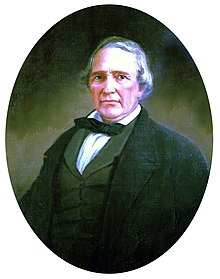Edward Bishop Dudley
| Edward Bishop Dudley | |
|---|---|
 |
|
| 28th Governor of North Carolina | |
|
In office December 31, 1836 – January 1, 1841 |
|
| Preceded by | Richard Dobbs Spaight, Jr. |
| Succeeded by | John Motley Morehead |
| Member of the U.S. House of Representatives from North Carolina's 5th district |
|
|
In office November 10, 1829 – March 3, 1831 |
|
| Preceded by | Gabriel Holmes |
| Succeeded by | Romulus M. Saunders |
| Member of the North Carolina House of Commons | |
|
In office 1816–1817 |
|
| Personal details | |
| Born | December 15, 1789 Onslow County, North Carolina |
| Died | October 30, 1855 (aged 65) Wilmington, North Carolina |
| Political party | Whig |
Edward Bishop Dudley (December 15, 1789 – October 30, 1855) was the 28th Governor of the U.S. state of North Carolina from 1836 to 1841. He served in the United States House of Representatives as a Jacksonian from 1829 to 1831.
Born near Jacksonville, North Carolina, the son of Christopher Dudley, a wealthy farmer and businessman, and Margaret Snead. Dudley entered politics early in life. In 1811, at age twenty-one, he was elected to the lower house of the state legislature from Onslow County. He was reelected in 1812, and in 1814 he was elected to the state senate. During the War of 1812, between service in the legislature, he was second in command of a regiment from Onslow. The regiment was stationed at Wilmington, and he liked the area and moved there permanently after the war. In 1815 he married Eliza Haywood; they had six children. After Eliza's death he married the widow of General John Cowan.
In 1816 Dudley won election to the lower house of the state legislature from the borough of Wilmington and won reelection in 1817. Dudley did not work with the "Old Republicans," North Carolina's dominant political faction, but instead actively joined a group of opportunists who formed a "People party" ticket, and in 1824 Dudley was an elector. The People party won and gave their vote to Andrew Jackson. In 1828, after the "Old Republicans" were also backing Jackson, Dudley was again a Jackson elector, and Jackson easily carried the state. Dudley's support of Jackson would soon end. Gabriel Holmes, the congressman from Dudley's district, died, and in 1829 Dudley won a special election to replace him. In his only term in Congress Dudley usually voted against Jackson's party, and he chose not to run for reelection.
In 1831 and 1832 Dudley was active in a group, headed by former Secretary of the Navy John Branch, that denounced Martin Van Buren, whom Dudley opposed more vehemently than he did Jackson, while professing to support Jackson. The group nominated Jackson for president and Philip Pendleton Barbour for vice president. Dudley served as an elector, but the Jackson-Barbour ticket was badly beaten. Nevertheless, this coalition of Van Buren's enemies, which had at first received support from National Republicans, would reemerge in the 1830s as the Whig party, of which Dudley became a member.
...
Wikipedia
